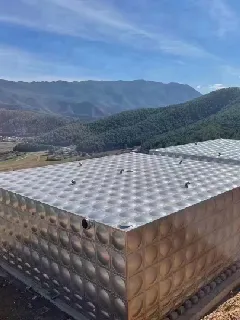loading...
- No. 9, Xingyuan South Street, Dongwaihuan Road, Zaoqiang County, Hengshui, Hebei, China
- admin@zjcomposites.com
- +86 15097380338
- Welcome to visit our website!
fibreglass storage tanks
The Benefits of Fibreglass Storage Tanks
In recent decades, fibreglass storage tanks have gained significant popularity across various industries, offering numerous advantages over traditional materials such as steel and concrete. These tanks are primarily made from a composite material combining glass fibers and resin, providing a robust solution for the storage of liquids, chemicals, and other hazardous materials.
One of the most commendable features of fibreglass storage tanks is their resistance to corrosion. Unlike metal tanks, which can rust and deteriorate when exposed to moisture and certain chemicals, fibreglass is inherently resistant to corrosion. This quality makes them ideal for storing a wide array of substances, from water to highly corrosive chemicals, without the risk of contamination or leakages. The longevity of fibreglass tanks can, therefore, lead to reduced replacement costs and lower maintenance expenses over time.
Another significant advantage is the lightweight nature of fibreglass. Compared to steel or concrete, fibreglass tanks are much lighter, which means easier transportation and installation. This can significantly reduce overall project costs and timelines, making fibreglass tanks an attractive option for businesses looking to optimize their operations.
Fibreglass storage tanks also exhibit excellent flexibility and adaptability. They can be manufactured in various shapes and sizes, catering to specific storage needs without compromising on durability or safety. Customisation allows businesses to optimise their storage solutions, accommodating unique operational requirements and spatial constraints.
fibreglass storage tanks

Moreover, fibreglass tanks provide superior insulation properties. The composite materials used in their construction are effective in maintaining temperature stability, which is particularly beneficial when storing temperature-sensitive liquids. This insulation helps to prevent degradation of stored materials, ensuring their quality and effectiveness.
From an environmental perspective, fibreglass storage tanks are often viewed as a more sustainable option. Their extended lifespan and reduced need for maintenance mean fewer resources are consumed in their lifecycle. Additionally, manufacturers are increasingly adopting environmentally friendly practices in the production of fibreglass, contributing to a lower environmental footprint.
Finally, safety is paramount in any storage operation. Fibreglass storage tanks are designed with safety features that minimize the risk of leaks and spills, which is essential for protecting both workers and the environment. Their smooth, non-porous surfaces are easier to clean and less likely to harbor harmful bacteria, making them a safer choice for the storage of potable water and other consumables.
In conclusion, fibreglass storage tanks offer a range of benefits, including corrosion resistance, lightweight construction, flexibility in design, insulation properties, environmental sustainability, and safety features. As industries continue to seek efficient and reliable storage solutions, the adoption of fibreglass tanks is likely to grow, leading to enhanced operational efficiency and safety across various sectors.
-
The Rise of FRP Profiles: Strong, Lightweight, and Built to LastNewsJul.14,2025
-
SMC Panel Tanks: A Modern Water Storage Solution for All EnvironmentsNewsJul.14,2025
-
GRP Grating: A Modern Solution for Safe and Durable Access SystemsNewsJul.14,2025
-
Galvanized Steel Water Tanks: Durable, Reliable, and Ready for UseNewsJul.14,2025
-
FRP Mini Mesh Grating: The Safer, Smarter Flooring SolutionNewsJul.14,2025
-
Exploring FRP Vessels: Durable Solutions for Modern Fluid HandlingNewsJul.14,2025
-
GRP Structures: The Future of Lightweight, High-Performance EngineeringNewsJun.20,2025
